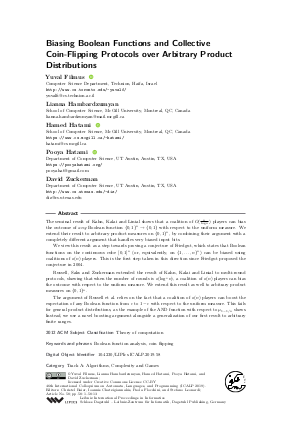Biasing Boolean Functions and Collective Coin-Flipping Protocols over Arbitrary Product Distributions
Authors
Yuval Filmus  ,
Lianna Hambardzumyan,
Hamed Hatami
,
Lianna Hambardzumyan,
Hamed Hatami  ,
Pooya Hatami
,
Pooya Hatami  ,
David Zuckerman
,
David Zuckerman
-
Part of:
Volume:
46th International Colloquium on Automata, Languages, and Programming (ICALP 2019)
Part of: Series: Leibniz International Proceedings in Informatics (LIPIcs)
Part of: Conference: International Colloquium on Automata, Languages, and Programming (ICALP) - License:
 Creative Commons Attribution 3.0 Unported license
Creative Commons Attribution 3.0 Unported license
- Publication Date: 2019-07-04
File

PDF
LIPIcs.ICALP.2019.58.pdf
- Filesize: 478 kB
- 13 pages
Document Identifiers
Related Versions
-
A full version of the paper is available at https://eccc.weizmann.ac.il/report/2019/029/.
Subject Classification
ACM Subject Classification
- Theory of computation
Keywords
- Boolean function analysis
- coin flipping
Metrics
- Access Statistics
-
Total Accesses (updated on a weekly basis)
0Document
0Metadata
Abstract
The seminal result of Kahn, Kalai and Linial shows that a coalition of O(n/(log n)) players can bias the outcome of any Boolean function {0,1}^n -> {0,1} with respect to the uniform measure. We extend their result to arbitrary product measures on {0,1}^n, by combining their argument with a completely different argument that handles very biased input bits.
We view this result as a step towards proving a conjecture of Friedgut, which states that Boolean functions on the continuous cube [0,1]^n (or, equivalently, on {1,...,n}^n) can be biased using coalitions of o(n) players. This is the first step taken in this direction since Friedgut proposed the conjecture in 2004.
Russell, Saks and Zuckerman extended the result of Kahn, Kalai and Linial to multi-round protocols, showing that when the number of rounds is o(log^* n), a coalition of o(n) players can bias the outcome with respect to the uniform measure. We extend this result as well to arbitrary product measures on {0,1}^n.
The argument of Russell et al. relies on the fact that a coalition of o(n) players can boost the expectation of any Boolean function from epsilon to 1-epsilon with respect to the uniform measure. This fails for general product distributions, as the example of the AND function with respect to mu_{1-1/n} shows. Instead, we use a novel boosting argument alongside a generalization of our first result to arbitrary finite ranges.
Cite As Get BibTex
Yuval Filmus, Lianna Hambardzumyan, Hamed Hatami, Pooya Hatami, and David Zuckerman. Biasing Boolean Functions and Collective Coin-Flipping Protocols over Arbitrary Product Distributions. In 46th International Colloquium on Automata, Languages, and Programming (ICALP 2019). Leibniz International Proceedings in Informatics (LIPIcs), Volume 132, pp. 58:1-58:13, Schloss Dagstuhl – Leibniz-Zentrum für Informatik (2019)
https://doi.org/10.4230/LIPIcs.ICALP.2019.58
BibTex
@InProceedings{filmus_et_al:LIPIcs.ICALP.2019.58,
author = {Filmus, Yuval and Hambardzumyan, Lianna and Hatami, Hamed and Hatami, Pooya and Zuckerman, David},
title = {{Biasing Boolean Functions and Collective Coin-Flipping Protocols over Arbitrary Product Distributions}},
booktitle = {46th International Colloquium on Automata, Languages, and Programming (ICALP 2019)},
pages = {58:1--58:13},
series = {Leibniz International Proceedings in Informatics (LIPIcs)},
ISBN = {978-3-95977-109-2},
ISSN = {1868-8969},
year = {2019},
volume = {132},
editor = {Baier, Christel and Chatzigiannakis, Ioannis and Flocchini, Paola and Leonardi, Stefano},
publisher = {Schloss Dagstuhl -- Leibniz-Zentrum f{\"u}r Informatik},
address = {Dagstuhl, Germany},
URL = {https://drops.dagstuhl.de/entities/document/10.4230/LIPIcs.ICALP.2019.58},
URN = {urn:nbn:de:0030-drops-106340},
doi = {10.4230/LIPIcs.ICALP.2019.58},
annote = {Keywords: Boolean function analysis, coin flipping}
}
Author Details
Funding
- Filmus, Yuval: Taub Fellow - supported by the Taub Foundations. The research was funded by ISF grant 1337/16.
- Hatami, Hamed: Supported by an NSERC grant.
- Hatami, Pooya: Supported by a Simons Investigator Award (#409864, David Zuckerman).
- Zuckerman, David: Supported by NSF Grant CCF-1705028 and a Simons Investigator Award (#409864).
Acknowledgements
Part of the work on this paper was done while the first three authors were at the Simons Institute for the Theory of Computing at Berkeley, CA, USA.
References
-
Miklós Ajtai and Nathan Linial. The influence of large coalitions. Combinatorica, 13(2):129-145, 1993.

-
Michael Ben-Or and Nathan Linial. Collective coin flipping. Advances in Computing Research, 5:91-115, 1989.

-
Michael Ben-Or, Nathan Linial, and Michael Saks. Collective coin flipping and other models of imperfect randomness. IBM Thomas J. Watson Research Division, 1989.

-
Jean Bourgain, Jeff Kahn, Gil Kalai, Yitzhak Katznelson, and Nathan Linial. The influence of variables in product spaces. Israel Journal of Mathematics, 77(1-2):55-64, 1992.

-
Eshan Chattopadhyay and David Zuckerman. Explicit two-source extractors and resilient functions. Annals of Mathematics, to appear, 2016. Preliminary version in STOC 2016.

-
Benny Chor and Cynthia Dwork. Randomization in Byzantine Agreement. Advances in Computing Research, 5:443-497, 1989.

-
Yevgeniy Dodis. Fault-tolerant leader election and collective coin-flipping in the full information model. Survey, 2006.

-
Uriel Feige. Noncryptographic Selection Protocols. In Proceedings of the 40th Annual Symposium on Foundations of Computer Science, page 142. IEEE Computer Society, 1999.

-
Ehud Friedgut. Influences in Product Spaces: KKL and BKKKL Revisited. Combinatorics, Probability and Computing, 13(1):17-29, 2004.

-
Jeff Kahn, Gil Kalai, and Nathan Linial. The influence of variables on Boolean functions. In Proceedings of the 29th annual FOCS, pages 68-80, 1988.

-
Raghu Meka. Explicit resilient functions matching Ajtai-Linial. In Proceedings of the Twenty-Eighth Annual ACM-SIAM Symposium on Discrete Algorithms, pages 1132-1148. SIAM, 2017.

-
Alexander Russell, Michael Saks, and David Zuckerman. Lower bounds for leader election and collective coin-flipping in the perfect information model. SIAM Journal on Computing, 31(6):1645-1662, 2002.

-
Alexander Russell and David Zuckerman. Perfect information leader election in log* n+ O (1) rounds. Journal of Computer and System Sciences, 63(4):612-626, 2001.

- Terence Tao. Soft analysis, hard analysis, and the finite convergence principle. URL: https://terrytao.wordpress.com/2007/05/23/soft-analysis-hard-analysis-and-the-finite-convergence-principle/, 2007. Accessed 10 Feb 2019.
